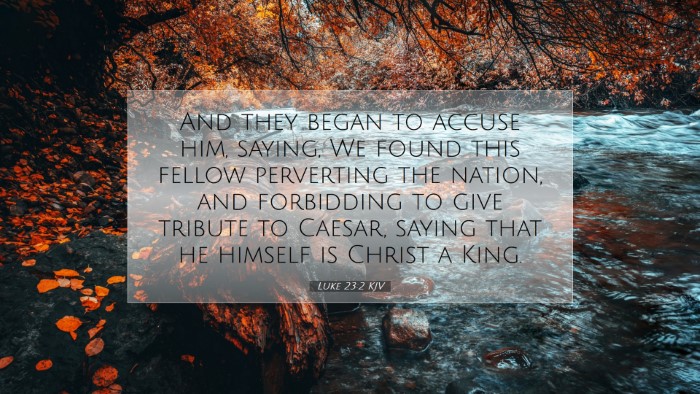Commentary on Luke 23:2
Luke 23:2 states:
"And they began to accuse him, saying, We found this fellow perverting the nation, and forbidding to give tribute to Caesar, saying that he himself is Christ a King."
This verse marks a pivotal moment in the trials of Jesus, encapsulating the charges brought forth by the religious authorities against Him. The accusations are significant not only for their content but also for their theological and political implications.
Contextual Overview
Prior to this verse, Jesus has been arrested and brought before the assembly of the Jewish authorities, who seek to have Him convicted. This verse reveals the nature of their accusations, emphasizing the need to align their charges with the Roman legal framework, as they are under Roman jurisdiction.
Accusations Against Jesus
-
Perverting the Nation:
This accusation suggests that Jesus was leading the people astray. Matthew Henry comments on this term, noting that it demonstrates how the Jewish leaders viewed Jesus' teachings as a threat to traditional beliefs and societal norms.
-
Forbidding Tribute to Caesar:
They accuse Him of telling the people not to pay taxes, a direct challenge to Roman authority. Albert Barnes notes that this was a calculated charge aiming to incite the Roman government against Jesus, as tax evasion was a serious offense.
-
Claiming Kingship:
The declaration that Jesus claimed to be "Christ a King" was a serious accusation, as it implied insurrection against the Roman authority, which was intolerable under Roman law. Adam Clarke emphasizes the political ramifications of this claim, interpreting it as an assertion of sovereignty that could lead to rebellion.
Theological Implications
The charges against Jesus highlight the intersection of religion and politics in the event of His trial. The authorities attempt to construct a case that not only condemns Him as a blasphemer but also as a social and political rebel. This dual nature of the charges illustrates the complexities involved in Jesus' mission as the Messiah.
Theological Reflection
According to Matthew Henry, the implication that Jesus was 'perverting the nation' speaks volumes about the misunderstanding of His mission among the Jewish leaders. They saw Him as a disruptor of their authority, while in truth, He sought to fulfill the law and reveal a deeper understanding of the Kingdom of God.
Barnes further reflects on the audacity of the religious leaders, who were more concerned with their political power and status than with the truth of Jesus’ message. The fear of losing their position led them to manipulate perceptions of Jesus to serve their ends.
Application for Pastors and Theologians
This passage serves as a reminder of the challenges faced by those who stand for truth in a world that often favors power and popularity. The response of the religious authorities can be seen as a cautionary tale about the dangers of allowing fear of human authority to override fidelity to divine truth.
Contemporary Issues
In modern ministries, this account encourages leaders to guard their congregations against misconceptions about the nature of God’s kingdom. It serves as an exhortation to uphold the true message of Christ, even in environments where such teachings may be seen as countercultural.
Conclusion
Luke 23:2 lays bare the unjust and politically charged nature of the charges against Jesus. As we reflect on these accusations, we are reminded of the precarious balance between faith and societal expectations. In understanding the implications of His trial, we can better grasp the significance of His sacrifice and the inception of a new covenant for believers.
Ultimately, the significance of Jesus’ kingship transcends earthly political frameworks, pointing believers toward a higher allegiance to the Kingdom of God and its values, which are oftentimes at odds with worldly powers.


